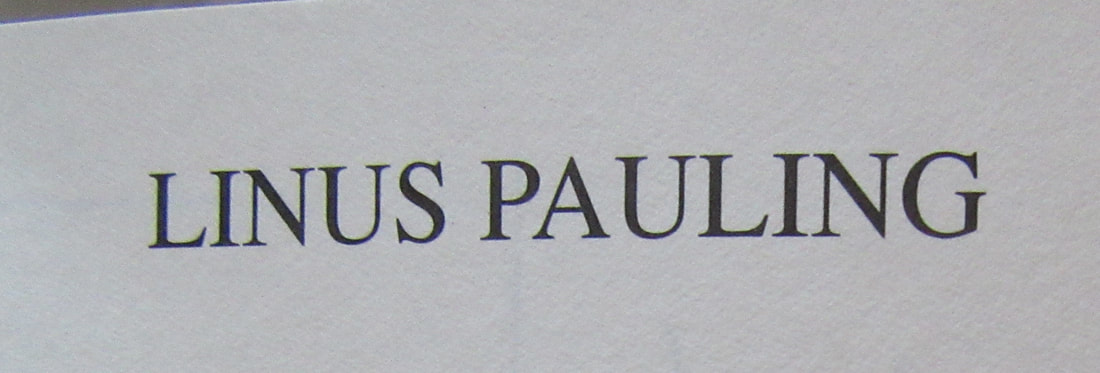
Veery:
Do you find you have personalized your work process around your habits, schedule?
Or do you veto your schedule, habits and just go full tilt, damn the calendar?
Linus Pauling:
It depends on the project and circumstances. Often I work on a problem steadily, almost day and night for weeks, two or three weeks perhaps. Often too I have decided that the time has come for me to stop attacking the problem, one might say put it on the back burner; and then it has happened a number of times that years later I’ve suddenly had an idea, I’ve seen how to solve that problem. So with different problems, I handle the attack on them in different ways.
Veery:
What scientists do you respect?
Linus Pauling:
Well, I knew Einstein just moderately well, I was with him a number of times, and he always invited my wife and me to come and see him whenever we were on the East coast. I had great respect for him and still have. He was a person who believed that if there were a puzzle, something that puzzled him that he couldn’t understand, that he should try to find the answer to clarify the matter. But also he was of course a great humanitarian, a believer in world peace, an opponent to militarism, and in this respect also I felt a kinship with him.
Veery:
Science and social/political concerns. Does one have business with the other?
Linus Pauling:
My answer to that question is that essentially every problem in the modern world has some scientific content. Scientists themselves may have some difficulty in analyzing the problem (for example the greenhouse effect or the hole in the ozone layer), but one thing I’m sure of is that scientists have a somewhat better grasp of what the problem is than the non-scientists have; so I have contended over the years that it is the duty of scientists to help their fellow citizens to understand the problems: and if the scientist is good at exposition, at public speaking, it may be that he would give talks about the problem. If he isn’t good at it, he might write a letter to the editor of the newspaper, for example. Also, I reached the conclusion a long time ago that a scientist should not suppress his own feelings about a problem. I think that it could be helpful to his fellow citizens for the scientist to say ”my feeling is that we should take such and such action with respect to the greenhouse effect or the hole in the ozone layer.”
Veery:
Did you have any tough years of trying to make it all work, money, prestige?
Linus Pauling:
Well, my mother had a very hard time. My father died when I was nine years old, leaving my mother a widow with three small children. I was the eldest at nine and two younger sisters and with not much money. This resulted in several problems for me. When I finished high school, I had a job in a machine shop, and they raised my salary every pay day, and my mother was so in need of money that she hoped that I would continue to work in the machine shop and bring home a larger and larger pay check every week or two. I had difficulty in deciding or perhaps insisting on going to college, and some friends, an uncle and aunt of a boy my own age, were responsible for saying that I should go on to college. During my first year in college, I made money by doing odd jobs of one sort or another. And there’s a period when I didn’t have money enough to pay for board and room in the boarding house, but I paid for the room and then spent what money I had getting food (and I didn’t have enough knowledge of how to get along, how to buy bread and cheese for example); so I just had difficulty in getting enough to eat and from then on . . . well the next year the people in the chemistry department gave me a job as assistant preparing chemicals for the student laboratories and so on, and from then on I at least got enough to live on and to give some to my mother. So we were pretty much financially strapped when I was a boy.
Veery:
And then when you graduated, how were things then? Did you fall right in to a faculty job?
Linus Pauling:
Well, when I got my bachelor’s degree in chemical engineering, I had been working as a chemical engineer during the summer months, but I also received a fellowship that enabled me to do graduate work at Cal Tech; and from then on I was getting enough money to support myself, and I got married, and later we had a family. I didn’t worry about having a job because I just assumed that I’d be made an assistant professor, which I was, so from then on at least I was making a reasonable amount of money doing the work I like to do, teaching chemistry and carrying on research.
Veery, 1993
Nobel Prize 1954, Science
&
Nobel Prize 1962, Peace